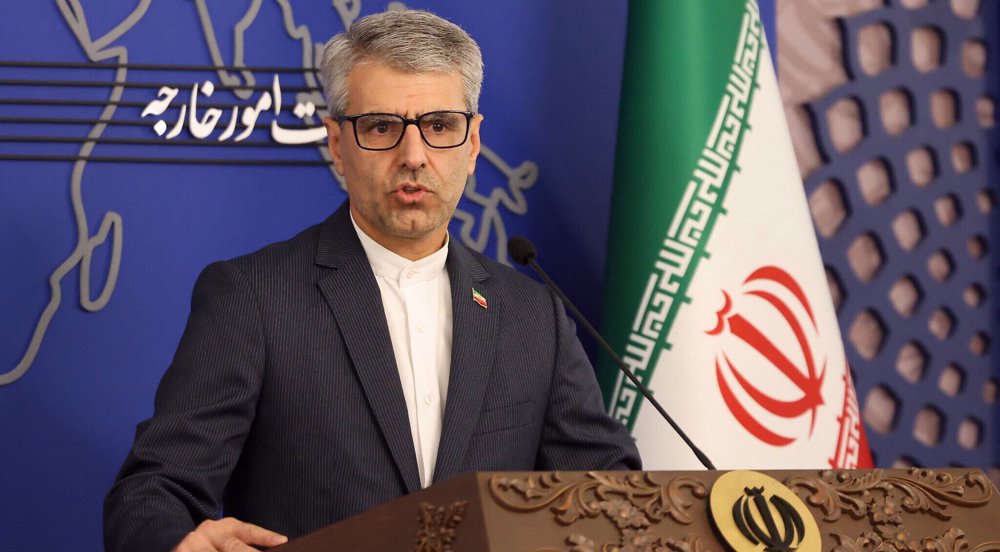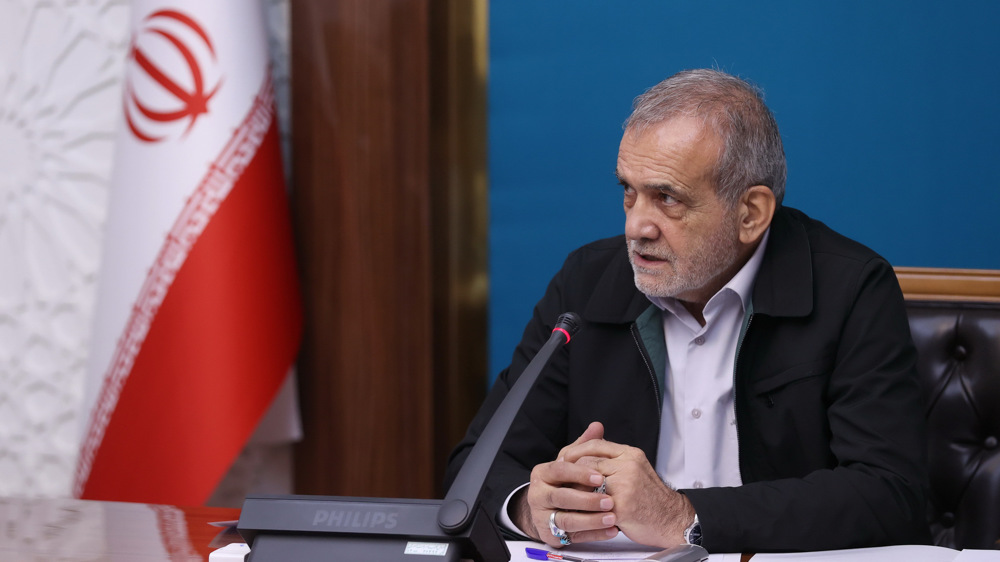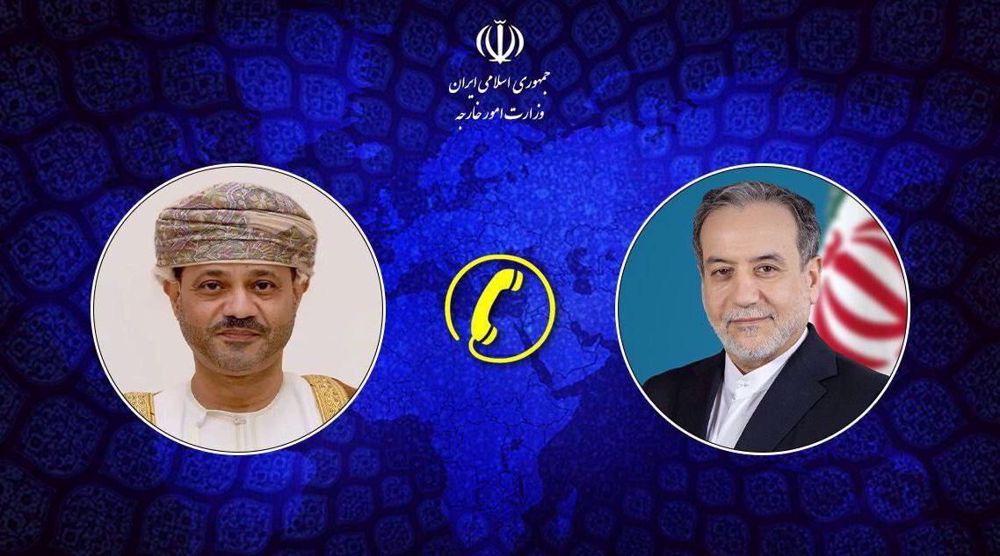Europe must pressure US to comply with Iran nuclear deal: Zarif
Iranian Foreign Minister Mohammad Javad Zarif says Europe must pressure the United States to fulfill its obligations under the 2015 nuclear agreement amid Washington's threat to pull out of it.
"Europe must put the US under pressure to implement its commitments and not allow the US to make illogical and unlawful demands despite its lack of commitment and violations [of its commitments]," Zarif said in a meeting with France's Foreign Minister Jean-Yves Le Drian in Tehran on Monday.
He added that the nuclear deal, officially known as the Joint Comprehensive Plan of Action (JCPOA), was a multilateral agreement reached between Iran and the P5+1 group of countries in 2015 in cooperation with Europe.
Zarif emphasized that the International Atomic Energy Agency (IAEA), which is tasked with monitoring Iran’s compliance with its nuclear-related commitments under the JCPOA, has verified the Islamic Republic's compliance with the deal in 10 reports.

Iran and the P5+1 countries - namely the US, Russia, China, France and Britain plus Germany - finalized the nuclear accord in July 2015 and started implementing it in January 2016.
Under the deal, Iran undertook to apply certain limits to its nuclear program in exchange for the termination of all nuclear-related sanctions against Tehran.
Director General of the International Atomic Energy Agency (IAEA) Yukiya Amano on Monday once again confirmed Iran's compliance with the JCPOA, warning that any collapse of the deal would be a "great loss."
"As of today, I can state that Iran is implementing its nuclear-related commitments…If the JCPOA were to fail, it would be a great loss for nuclear verification and for multilateralism," Amano said in a speech to a quarterly meeting of the agency's Board of Governors in Vienna.
Read more:
Zarif also said that Europe has been affected by the unwise and politically-motivated US approaches, but can play a more constructive role in saving the JCPOA as a great international achievement.
He added that all signatories to the JCPOA must equally attach significance to preserving "this international diplomatic achievement," noting that it would not be effective to give only verbal support to the deal.
"If the international community is to try to convince one side to stay in the nuclear deal, it is Iran and not the US, which should be convinced," the top Iranian diplomat said, adding that Washington has not only failed to fully comply with its obligations, but even barred Europe from fulfilling its own commitments.
US President Donald Trump has repeatedly described the JCPOA, which was negotiated under his predecessor, Barack Obama, as “the worst and most one-sided transaction Washington has ever entered into,” a characterization he often used during his presidential campaign, and threatened to tear it up.
Trump has threatened to pull out of the JCPOA unless Congress and America's European allies help "fix" it with a follow-up agreement within a 120-day deadline.
Referring to earlier remarks by the French foreign minister about Iran's ballistic missile program, Zarif said the JCPOA and the United Nations Security Council Resolution 2231, which endorses the deal, do not involve the Islamic Republic's missile capabilities.
"The US and other countries that have turned our region into a powder keg by selling weapons must stop such measures," the Iranian foreign minister stated.
He emphasized that Iran's military prowess is strictly for defensive and deterrent purposes, saying the country must only rely on its own deterrent power to defend its citizens.
Ahead of his visit, Le Drian had said that Iran should address "concerns" over its ballistic missile program or risk new sanctions.
“There are ballistic programs of missiles that can reach several thousand kilometers, which are not compatible with UN Security Council resolutions and exceed the sole need of defending Iran’s borders,” he told the Journal du Dimanche newspaper, adding, “If not tackled head-on, this country risks new sanctions.”
Deputy Chief of Staff of Iran's Armed Forces Brigadier General Massoud Jazayeri said on Saturday that the Islamic Republic would hold no negotiations over its missile program unless the United States and Europe dismantle their nuclear weapons and long-range missiles.
"What Americans say out of desperation with regards to limiting the Islamic Republic of Iran's missile capabilities is an unattainable dream resulting from their regional failures and defeats," Jazayeri added.
The senior Iranian commander's remarks came on the same day that Ali Akbar Velayati, a senior adviser to Leader of the Islamic Revolution Ayatollah Seyyed Ali Khamenei on international affairs, also said the Islamic Republic's defense program is no concern of other countries.
"Iran is an independent country and can defend itself in any way it sees fit whether with missiles or any other defensive means," Velayati told reporters in Tehran.
Read more:
- Iran’s missile program does not breach UN resolution: Foreign Ministry
- Iran’s missile tests not linked to UN resolution on nuclear deal: Qassemi
- Iran deal only covers nuclear-related issue: EU foreign policy chief
France determined to implement JCPOA: Le Drian
The French foreign minister, for his part, said his country is strongly determined to implement the JCPOA and has carried out many practical measures in this regard.
Le Drian added that Tehran and Paris have started positive banking cooperation and noted that the French companies' investment in Iran had considerably increased after the JCPOA took effect.
In 2017, France was Iran's second biggest trade partner in the European Union. According to the French Treasury, Iran's trade exchanges with France stood at €3.8 billion last year.
Since the lifting of the sanctions in January 2016, French automakers have piled into Iran’s resurgent market, helping turn around a period of slipping sales, which occurred when they left the country in 2012.
Also, France's oil and gas company, Total, has signed an agreement worth $4.8 billion for the development of South Pars Phase 11.
On the eve of the French foreign minister's visit to Tehran, Iranian President Hassan Rouhani and his French counterpart, Emmanuel Macron, held a phone conversation on Sunday.
The two presidents discussed the latest developments regarding Iran's nuclear deal with the P5+1 group of countries and the current situation in Syria's Eastern Ghouta.
Read more:
Tehran reaffirms drive to deepen defense ties with West African countries
US envoy’s remarks on Israeli West Asia expansion shows Muslim world targeted: Houthi
Iran says any agreement with US must fully safeguard national rights, interests
VIDEO | Press TV's news headlines
Trump administration terminates aid programs to seven African countries: Report
IRGC warship back home after long-range deployment for BRICS naval drills
Democrats’ secret ‘autopsy’ report of 2024 election links Harris’ loss to Gaza stance
'Defeat is certain for them’: Iran Army chief derides enemy’s claim of invincibility














 This makes it easy to access the Press TV website
This makes it easy to access the Press TV website